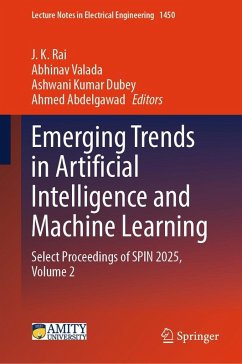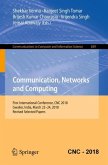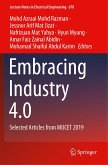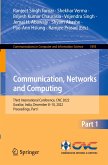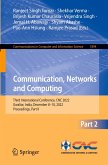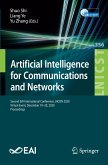Emerging Trends in Artificial Intelligence and Machine Learning
Select Proceedings of SPIN 2025, Volume 2
Herausgegeben:Rai, J. K.; Valada, Abhinav; Dubey, Ashwani Kumar; Abdelgawad, Ahmed
Emerging Trends in Artificial Intelligence and Machine Learning
Select Proceedings of SPIN 2025, Volume 2
Herausgegeben:Rai, J. K.; Valada, Abhinav; Dubey, Ashwani Kumar; Abdelgawad, Ahmed
- Gebundenes Buch
- Merkliste
- Auf die Merkliste
- Bewerten Bewerten
- Teilen
- Produkt teilen
- Produkterinnerung
- Produkterinnerung
This volume comprises selected peer-reviewed proceedings of the 12th International Conference on Signal Processing and Integrated Networks (SPIN 2025). It aims to provide a comprehensive and broad-spectrum picture of state-of-the-art research and development in signal processing, IoT sensors, systems and technologies, cloud computing, wireless communication, and wireless sensor networks. This volume will provide a valuable resource for those in academia and industry.
Andere Kunden interessierten sich auch für
![Emerging Trends in IoT and Wireless Communication Emerging Trends in IoT and Wireless Communication]() Emerging Trends in IoT and Wireless Communication214,99 €
Emerging Trends in IoT and Wireless Communication214,99 €![Communication, Networks and Computing Communication, Networks and Computing]() Communication, Networks and Computing38,99 €
Communication, Networks and Computing38,99 €![Embracing Industry 4.0 Embracing Industry 4.0]() Embracing Industry 4.098,99 €
Embracing Industry 4.098,99 €![Communication, Networks and Computing Communication, Networks and Computing]() Communication, Networks and Computing61,99 €
Communication, Networks and Computing61,99 €![Communication, Networks and Computing Communication, Networks and Computing]() Communication, Networks and Computing61,99 €
Communication, Networks and Computing61,99 €![Artificial Intelligence for Communications and Networks Artificial Intelligence for Communications and Networks]() Artificial Intelligence for Communications and Networks76,99 €
Artificial Intelligence for Communications and Networks76,99 €![Advanced Hybrid Information Processing Advanced Hybrid Information Processing]() Advanced Hybrid Information Processing68,99 €
Advanced Hybrid Information Processing68,99 €-
-
-
This volume comprises selected peer-reviewed proceedings of the 12th International Conference on Signal Processing and Integrated Networks (SPIN 2025). It aims to provide a comprehensive and broad-spectrum picture of state-of-the-art research and development in signal processing, IoT sensors, systems and technologies, cloud computing, wireless communication, and wireless sensor networks. This volume will provide a valuable resource for those in academia and industry.
Produktdetails
- Produktdetails
- Lecture Notes in Electrical Engineering 1450
- Verlag: Springer / Springer Nature Singapore / Springer, Berlin
- Artikelnr. des Verlages: 978-981-96-9970-4
- Seitenzahl: 600
- Erscheinungstermin: 16. November 2025
- Englisch
- Abmessung: 241mm x 160mm x 36mm
- Gewicht: 1164g
- ISBN-13: 9789819699704
- ISBN-10: 9819699703
- Artikelnr.: 74801590
- Herstellerkennzeichnung
- Springer-Verlag KG
- Sachsenplatz 4-6
- 1201 Wien, AT
- ProductSafety@springernature.com
- Lecture Notes in Electrical Engineering 1450
- Verlag: Springer / Springer Nature Singapore / Springer, Berlin
- Artikelnr. des Verlages: 978-981-96-9970-4
- Seitenzahl: 600
- Erscheinungstermin: 16. November 2025
- Englisch
- Abmessung: 241mm x 160mm x 36mm
- Gewicht: 1164g
- ISBN-13: 9789819699704
- ISBN-10: 9819699703
- Artikelnr.: 74801590
- Herstellerkennzeichnung
- Springer-Verlag KG
- Sachsenplatz 4-6
- 1201 Wien, AT
- ProductSafety@springernature.com
J. K. Rai received his B.E. degree in Electronics Engineering from Shri Guru Gobind Singh College of Engineering and Technology, Nanded, India (1996), his M.Tech. degree in Electronics Engineering from Visvesvaraya Regional College of Engineering, Nagpur, India (1999), and his Doctoral degree from Motilal Nehru National Institute of Technology, Deemed University, Allahabad (2011). He has 26 years of teaching experience and is currently working as a Professor and Head in the Department of Electronics and Communication Engineering, Amity School of Engineering and Technology, Amity University Uttar Pradesh, Noida, India. He has published more than 40 research papers in Scopus-indexed and SCI-indexed journals and international conferences. He has been granted one patent and has successfully guided three Ph.D. research scholars. His current research interests include artificial intelligence, machine learning, robotics, and medical signal and image processing. Abhinav Valada is a Professor at the University of Freiburg, where he directs the Robot Learning Lab. He is a member of the Department of Computer Science, the BrainLinks-BrainTools center, and a founding faculty member of the ELLIS Unit Freiburg. Abhinav is a DFG Emmy Noether AI Fellow, a Scholar of the ELLIS Society, and Chair of the IEEE Robotics and Automation Society Technical Committee on Robot Learning. He received his Ph.D. (summa cum laude) under Prof. Wolfram Burgard at the University of Freiburg in 2019, his M.S. in Robotics from Carnegie Mellon University in 2013, and his B.Tech. in Electronics and Instrumentation Engineering from VIT University in 2010. Prof. Abhinav’s research lies at the intersection of robotics, machine learning, and computer vision, with a focus on tackling fundamental problems in robot perception, state estimation, and planning to enable robots to operate reliably in complex and diverse environments. The overall goal of his research is to develop scalable, lifelong robot learning systems that continuously learn multiple tasks from what they perceive and experience through real-world interaction. For his research, he has received the IEEE RAS Early Career Award in Robotics and Automation, the NVIDIA Research Award, the AutoSens Most Novel Research Award, among others. Ashwani Kumar Dubey is a Professor in the Department of Electronics and Communication Engineering at ASET, Amity University Uttar Pradesh, Noida, India. He holds a B.E. (AMIE) in Electronics and Communication Engineering, an M.Tech. in Instrumentation and Control Engineering from Maharshi Dayanand University, Rohtak, and a Ph.D. in Electrical Engineering from Jamia Millia Islamia, New Delhi. With over two decades of academic and research experience, Dr. Dubey has held various teaching and administrative roles at leading institutions, including GD Goenka World Institute–Lancaster University (UK). He has published more than 90 research papers in reputed international and national journals and conferences. He has filed 23 patents (3 granted) and has actively contributed to organizing conferences. He has supervised over 10 Ph.D. scholars and continues to guide research in emerging technologies. Ahmed Abdelgawad received his M.S. and Ph.D. degrees in Computer Engineering from the University of Louisiana at Lafayette in 2007 and 2011, respectively, and subsequently joined IBM as a Design Aids & Automation Engineering Professional at the Semiconductor Research and Development Center. In Fall 2012, he joined Central Michigan University as an Assistant Professor of Computer Engineering. In Fall 2017, Dr. Abdelgawad was promoted early to Associate Professor of Computer Engineering. He is a senior member of IEEE. His areas of expertise include distributed computing for Wireless Sensor Networks (WSN), the Internet of Things (IoT), Structural Health Monitoring (SHM), data fusion techniques for WSN, low-power embedded systems, video processing, digital signal processing, robotics, RFID, localization, VLSI, and FPGA design. He has published two books and more than 80 articles in related journals and conferences.
Section 1: Foundations of AI and Machine Learning.- Analyzing the Performance of Classification Models and Sampling Techniques on Imbalanced Datasets.- TextPrep: Automating the Process of Text Data Pre-Processing by Leveraging Self-Supervised Learning.- Advancing Transfer Learning with GAP, Depth Constraints, and Average Depth Constraints for Diverse Datasets.- Knparaphraser: A Kannada Paraphrasing Model Based on Novel Data Augmentation Framework.- Section 2: AI for Health and Biomedical Research.- Accelerating DNA Sequence Alignment Using Optimized AI Techniques.- Drug Discovery for Mycobacterium Tuberculosis: A Synergistic Approach using QSAR and Machine Learning.- Analysis of Parkinson s Disease Detection using Machine Learning Algorithms.- Designing a Malaria Detection Scheme Using Convolutional Neural Network (CNN) and TensorFlow-Based Deep Learning Model.- A Machine Learning Approach for Anomaly Detection in COVID-19 PCR Test Results Using Isolation Forests.- Optimizing ICU Patient Management through Predictive Analysis.- Exploring Deep Learning Approaches for Sleep Apnea Detection.- etc.
Section 1: Foundations of AI and Machine Learning.- Analyzing the Performance of Classification Models and Sampling Techniques on Imbalanced Datasets.- TextPrep: Automating the Process of Text Data Pre-Processing by Leveraging Self-Supervised Learning.- Advancing Transfer Learning with GAP, Depth Constraints, and Average Depth Constraints for Diverse Datasets.- Knparaphraser: A Kannada Paraphrasing Model Based on Novel Data Augmentation Framework.- Section 2: AI for Health and Biomedical Research.- Accelerating DNA Sequence Alignment Using Optimized AI Techniques.- Drug Discovery for Mycobacterium Tuberculosis: A Synergistic Approach using QSAR and Machine Learning.- Analysis of Parkinson s Disease Detection using Machine Learning Algorithms.- Designing a Malaria Detection Scheme Using Convolutional Neural Network (CNN) and TensorFlow-Based Deep Learning Model.- A Machine Learning Approach for Anomaly Detection in COVID-19 PCR Test Results Using Isolation Forests.- Optimizing ICU Patient Management through Predictive Analysis.- Exploring Deep Learning Approaches for Sleep Apnea Detection.- etc.

